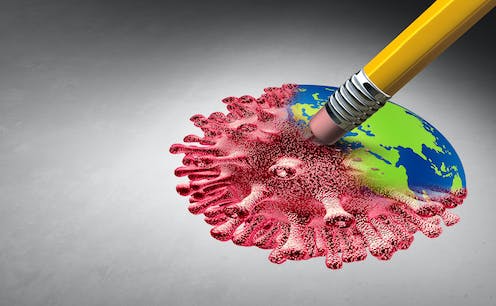
When the World Health Organization formally declared an end to the COVID-19 pandemic’s designation as a Public Health Emergency of International Concern (PHEIC), it may seem to have hadlittle, if any, perceivable impact on the daily lives of most people.
However, it would be a mistake to assume that this is a mere formality.
A PHEIC, like the one adopted for COVID-19 on Jan. 30, 2020, is declared if a public health event is determined to constitute:
- an extraordinary event;
- a public health risk to other states through the international spread, and
- potentially requiring a co-ordinated international response.
Under the International Health Regulations (IHR) — a legally-binding agreement which commits governments to certain actions when responding to the international spread of disease — the declaration of a PHEIC permits the WHO to issue temporary recommendations to national governments to support a co-ordinated and effective global response to such events.

(Jean-Christophe Bott/Keystone via AP)
A PHEIC means the WHO is sounding the loudest possible alarm to national governments to act together with urgency. A total of seven PHEICS have been declared since the IHR took effect in 2007: H1N1, Ebola, Polio, a second Ebola outbreak, Zika, COVID-19 and Mpox.
However, the heightened state of emergency under a PHEIC is not meant to be sustained indefinitely. The recommendations are temporary and require review every three months.
Significance of the end of the COVID-19 PHEIC
The lifting of PHEIC status for COVID-19 is significant for two reasons.
First, ending the emergency stands down the WHO’s formal authority to guide national COVID-19 policies. While the acute phase of the pandemic appears to have passed, this must still be balanced with continued response efforts aligned with the ongoing risk posed by the ever-evolving SARS-CoV-2.
Moreover, the phrase “no one is safe until everyone is safe” may have become a familiar tagline during the pandemic. Yet, many people, mostly in low- and middle-income countries, still struggle to access COVID-19 vaccines, diagnostics and treatments. Others, such as the immuno-compromised, remain subject to severe health outcomes.
With the impact of COVID-19 continuing to disproportionately affect vulnerable populations worldwide, the pandemic remains far from over.
Second, the standing down of the PHEIC declaration is accompanied by an understandable desire — and necessity — to “move on” from COVID-19 after three difficult years. Many high-income countries have been steadily returning to pre-COVID-19 life.

(Shutterstock)
However, the critical and challenging process of learning lessons from the pandemic — let alone addressing the shortcomings in the global response to COVID-19 — has just begun. Governments must ensure that “moving on” does not mean losing the opportunity to capture critical insights that will determine the effectiveness of future pandemic preparedness and response.
Perhaps the biggest lessons has been the failure of countries to co-ordinate on many aspects of the global COVID-19 response, such as access to vaccines and use of travel measures. The lack of real-world authority by the WHO to enforce the legally binding IHR has become abundantly clear.
Global co-ordination fell short
The Independent Panel for Pandemic Preparedness and Response, convened by the WHO to review the global response to the pandemic, characterized February 2020 as a “lost month” due to the overwhelming inaction of many countries after the PHEIC was declared.
Governments eventually began to take emergency action but only after the WHO made the strategic decision in March 2020 to declare COVID-19 a pandemic. Still, what ensued fell far short of a co-ordinated global effort.
Read more:
COVID-19 vaccine inequity allowed Omicron to emerge
The need for collective action during global public health emergencies like COVID-19 has only been reinforced by the past three years. Our research on the use of travel measures in response to COVID-19 has identified key policy areas where improving effectiveness depends on how willing countries are to act in a co-ordinated way.
For example, the chaos caused by varied and changing use of travel measures was due in part to the lack of an agreed risk-based approach. Among those that applied risk analysis, how risk was defined and approached varied substantially.
Additionally, travel measures implemented in response to COVID-19, and in previous PHEICs, fell inequitably upon different population groups. Further research is needed to understand and mitigate unfair impacts. Once again, better risk-based public health responses with more equitable outcomes will require countries to renew their commitment to work together.
If future co-ordination efforts are to be successful, governments must begin by understanding and addressing the shortcomings of existing legal frameworks, including the PHEIC and IHR.
Towards this end, WHO member states have begun simultaneous negotiation of IHR amendments, alongside a new pandemic legal instrument.
Previous outbreaks of concern, notably SARS-CoV-1 and H1N1, initially prompted new attention and investments in pandemic preparedness. However, these efforts were not sufficiently sustained. Whether and to what extent current efforts will compel countries to act in the collective interest is the crux of the issue.
Meanwhile, a new pandemic may already be on the horizon as the global and interspecies spread of highly pathogenic avian influenza is raising growing alarm. The adoption and now lifting of the PHEIC declaration during the COVID-19 pandemic, and actions taken by governments in between, offer clear lessons if the world is willing to learn them.
![]()
Julianne Piper is funded by the Pacific Institute on Pathogens, Pandemics and Society which receives funding from the BC Ministry of Health
Kelley Lee receives funding from the Canadian Institutes of Health Research, New Frontiers for Research Fund, and Social Sciences and Humanities Research Council of Canada. The Pacific Institute on Pathogens, Pandemics and Society (PIPPS) receives funding from the BC Ministry of Health.























